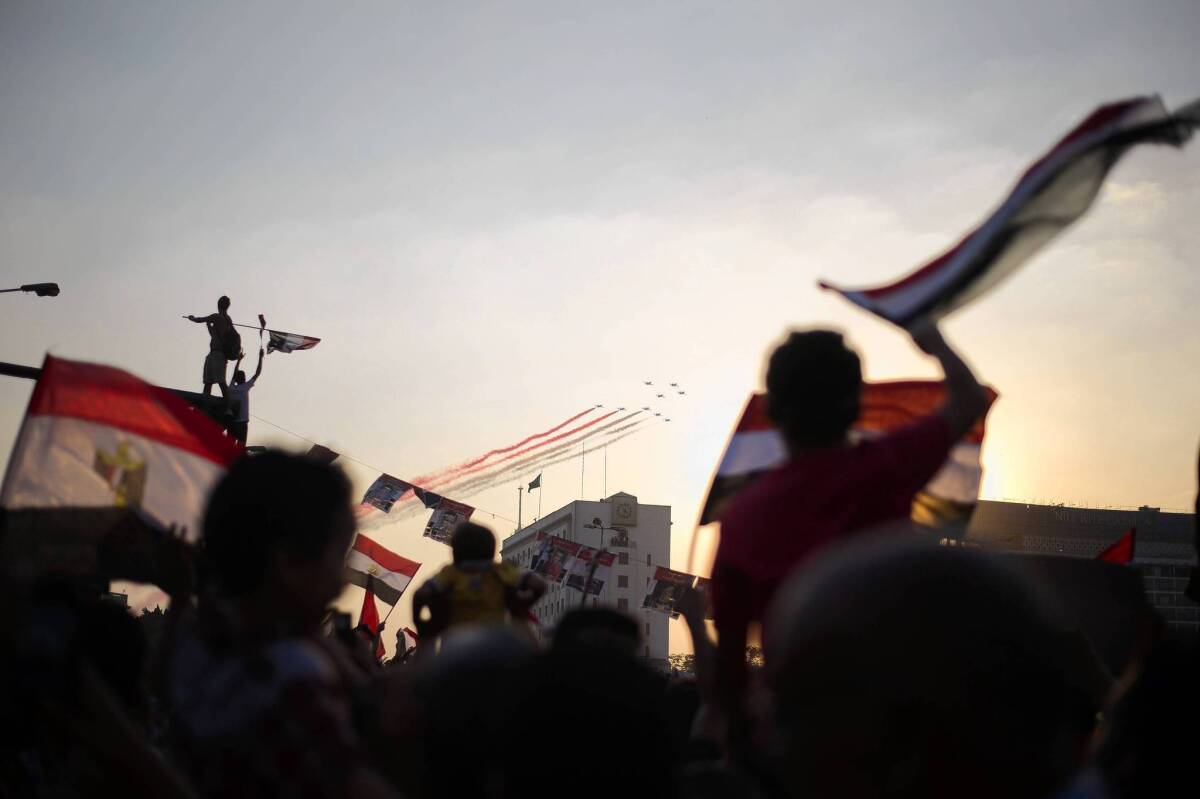Egypt military cracks down on Muslim Brotherhood

CAIRO — Prosecutors arrested officials of the Muslim Brotherhood in a nationwide crackdown to weaken the world’s most influential Islamist organization, as new national leaders installed by the military began preparing for elections aimed at leading Egypt out of two years of turmoil.
The roundup, coming a day after the military coup that toppled President Mohamed Morsi and the Brotherhood movement, indicated the army and judicial forces were determined to demoralize the Islamist organization that had led the nation’s first democratically elected government.
Tanks were in the streets, but much of Egypt was calm Thursday. Anger was building, however, among many Islamists infuriated by the takeover, and the military’s strategy could backfire. The Brotherhood’s victory in elections last year was seen as a bellwether for political Islam emerging from the so-called Arab Spring revolts of two years ago. Few predict the organization is finished.
“Islamist groups will see that the democratic path has failed and they will turn toward militancy and violence,” said Mohamed Rashad, standing amid tents and prayer rugs near a mosque in a Cairo neighborhood that for days has been a camp for Morsi supporters. “What has happened in Egypt is a threat to world security.”
Officials arrested Mohamed Badie, the Brotherhood’s supreme guide, and issued a warrant for his deputy, Khairat Shater, the group’s chief strategist and financier. Both are accused of inciting deadly clashes this week between antigovernment demonstrators and Morsi supporters.
Police also arrested Saad Katatni, head of the Brotherhood’s Freedom and Justice Party, and Rashad Bayoumi, the Brotherhood’s deputy leader. The men orchestrated the political campaign last year that brought fellow Brotherhood member Morsi to power.
Officials said 300 arrest warrants had been issued for Brotherhood members. Morsi was in custody and under criminal investigation for insulting the judiciary in comments he made during a final address to the nation Tuesday, before the expiration of a deadline issued by the military for him to restore order.
The military’s restrictions on the Brotherhood extended to banning its newspaper and shutting down its television station. Other Islamist stations were targeted as well. The Al Jazeera satellite network said Egyptian authorities were harassing its staff and attempting to limit its reporting.
In Washington, officials said President Obama met with members of his national security team Thursday to discuss the situation in Egypt. U.S. officials said they had made a round of phone calls urging that Egypt return power to a democratically elected civilian government as soon as possible and avoid arbitrary arrests of Morsi and his supporters, and that all sides avoid violence.
Actions by security forces were reminiscent of the mass arrests of Brotherhood figures, including Morsi and Shater, under the former police state of Hosni Mubarak, who was overthrown in the 2011 Arab Spring uprising. They raised the prospect of a new wave of retribution against the Brotherhood even as Judge Adly Mahmoud Mansour, inaugurated Thursday as Egypt’s acting president, urged unity.
“The Muslim Brotherhood are part of [Egypt] and are invited to participate in building the nation, as nobody will be excluded, and if they respond to the invitation, they will be welcomed,” said Mansour, chief of the Supreme Constitutional Court.
Morsi’s year in office was marked by repeated conflicts with the constitutional court, whose opinions attempted to curtail Morsi’s move to expand his power and advance the Brotherhood’s Islamist agenda. Morsi said the court was loyal to Mubarak’s administration and determined to sabotage his government.
The Brotherhood, as it was throughout Morsi’s rule, was defiant Thursday, seeking to rouse thousands of Islamists to protest against the military after Friday prayers the next day in a rally being called “Friday of Rejection.” A message posted on the group’s website read, “We reject participation in any work with the usurper authorities.”
The Brotherhood will suffer from the arrests and accusations and “this might weaken their political presence,” said Gamal Sultan, an Islamist analyst and newspaper editor. “But saying that this is the end of the Muslim Brotherhood is a slight exaggeration because they are a group with over 80 years of historical depth in Egypt and other countries as well.”
Morsi supporters at the Rabaa Al Adawiya mosque in the Nasr City neighborhood of Cairo spoke of conspiracies against the Brotherhood. The men and women, many of them bused in from the provinces, were dispirited and silent immediately after Wednesday’s coup. But by Thursday their rage was welling amid chants of “Down with military rule.”
“The army planned for this from last year. The entire aim is to bring down political Islam because it is against the security of Israel, and the U.S. does not want that,” said one of those present, Mohamed Ali. “But God will bring us victory; we are all here for Islam and the world should await the next wave of an Islamic revolution.”
Ashraf Ghoneim said the gas and power shortages that had plagued Egypt for weeks “suddenly vanished” after the military takeover.
“This shows it was all a part of a plot to bring down political Islam,” he said. “But thankfully there is no disagreement among us Islamists, and our movement will not be set back. We are in the millions armed with faith in God, and we will not respond to any attack with violence.”
Clashes in Egypt have left at least 10 people dead, and the tension complicated the political atmosphere for Mansour, 67, a little-known administrator and judge. After his swearing-in, Mansour said the youth-inspired protests that began on Sunday and ended with Morsi’s overthrow “corrected the path of the glorious revolution that took place on Jan. 25, 2011.”
He added that the Egyptian people “are the source of all powers and that the protests against Morsi united the people without discrimination or differentiation.”
But the new leader offered no timetable for formation of a coalition government or elections. Gen. Abdel Fattah Sisi, commander of the armed forces, told the country after the coup that religious and civilian leaders had “agreed on a road map for the future.”
Among them were other Islamist voices, including Ahmed Tayeb, grand imam of Al Azhar, the prestigious Sunni Muslim institute and mosque. Tayeb, who has often been at odds with the Brotherhood, met this week with military leaders to discuss the expected coalition government.
Ahmed Mansour, another Brotherhood supporter, said the organization must be part of the political process. Standing amid black flags of militancy and Morsi posters near the Rabaa Al Adawiya mosque, he said he hoped the Brotherhood would not instigate revolt but rather run again for office.
“The real reason behind this situation is that the army does not want political Islam to hold power,” he said. “What happens next depends on the Muslim Brotherhood. If they are able to let this fight go and run in elections … then political Islam in Egypt and elsewhere will survive.
“But if they continue in this battle, then political Islam may as a whole lose.”
Mohsen is a special correspondent. Special correspondent Ingy Hassieb contributed to this report.
More to Read
Sign up for Essential California
The most important California stories and recommendations in your inbox every morning.
You may occasionally receive promotional content from the Los Angeles Times.











